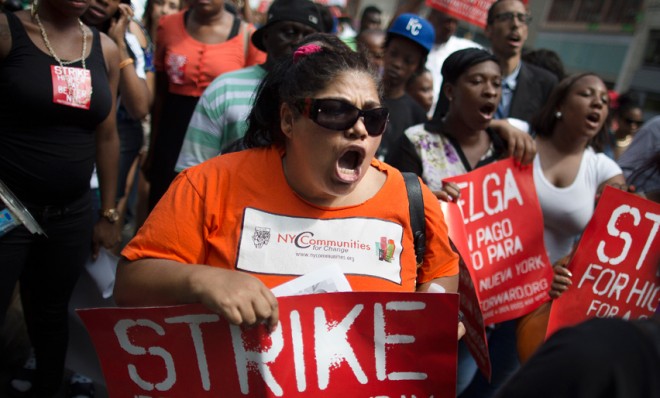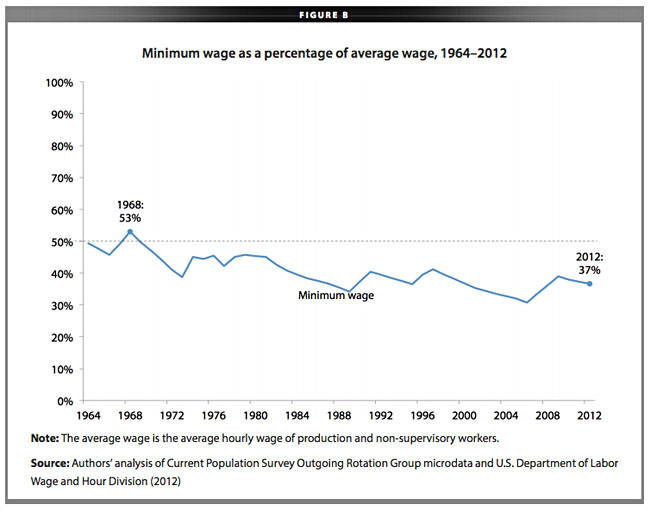What should the minimum wage be?
Setting aside the rancor of the political class, several economists argue that $7.25 an hour is far too low

A free daily email with the biggest news stories of the day – and the best features from TheWeek.com
You are now subscribed
Your newsletter sign-up was successful
Many fast food workers across the country are on strike demanding $15 an hour — more than double the federal minimum wage of $7.25.
That $15 figure strikes some as egregiously high. Conservative groups like the Employment Policies Institute — founded by hospitality and restaurant lobbyist Rick Berman — have published editorials arguing that raising the minimum wage would cost the country jobs. Even some progressives, like Christina D. Romer, the former chair of President Obama's Council of Economic Advisers, have argued that increasing the earned-income tax credit and increasing access to pre-kindergarten education are more effective anti-poverty tools than raising the minimum wage.
For the most part, however, raising the minimum wage — at least a little bit — isn't particularly controversial. A recent Gallup poll found that 71 percent of Americans support President Obama's proposal to increase the minimum wage to $9.
The Week
Escape your echo chamber. Get the facts behind the news, plus analysis from multiple perspectives.

Sign up for The Week's Free Newsletters
From our morning news briefing to a weekly Good News Newsletter, get the best of The Week delivered directly to your inbox.
From our morning news briefing to a weekly Good News Newsletter, get the best of The Week delivered directly to your inbox.
But how high should the minimum wage go?
Richard Kirsch, senior fellow at the progressive Roosevelt Institute, approaches the problem from the perspective of what workers need to survive and thrive. As such, he agrees with the nation's fast food workers: $15.
"If you look at a pretty basic economic living standard, that's about what one person has to make just to support themselves," Kirsch says. "We can't really move the economy forward when a growing sector of the workforce isn't making enough to support their families."
The latest report by the Bureau of Labor Statistics found that 46.2 million Americans are living below the poverty line — defined as $11,484 for an individual or $23,021 for a family of four. If a minimum-wage worker puts in 40 hours a week, he or she would make $15,080.
A free daily email with the biggest news stories of the day – and the best features from TheWeek.com
Douglas Hall, director of the Economic Analysis and Research Network at the nonpartisan Economic Policy Institute, focuses more on the economy as a whole rather than the needs of minimum-wage workers. He says the minimum wage should be 50 percent of the previous year's average wage for production and non-supervisory workers — or, as he puts it, "half the average wage for regular folks."
"For example, the July 2013 data pegged the average non-supervisory wage at $20.14, so half of that would be $10.07 — which, coincidentally, is very close to the $10.10 figure that Sen. Harkin (D-Iowa) and Rep. Miller (D-Calif.) have been proposing," says Hall. "Rather than choose some arbitrary number, this is something that clearly relates to what is going on in the labor market."
That also isn't too far from the $10.50 recommended by the 100 economists who signed a pledge supporting a proposal by Rep. Alan Grayson (D-Fla.).

Economist James Galbraith from the University of Texas at Austin argues that the minimum wage should be about $12. That figure fulfills two goals a minimum wage should have, he says.
1. It's lower than the national average wage, which, he says, should be a basic attribute of any proposed minimum wage figure.
2. It puts an upward pressure on wages, "giving businesses that can handle high wages an advantages over businesses that can't."
Why would you want to do that? Consider the construction industry in Texas.
"The median wage in construction is only $10," Galbraith says. "That means that the conditions of construction work has deteriorated a lot and depends on fly-by-night contracts that depend on undocumented labor."
"If you raise the minimum wage, you put pressure on those employers, and eventually firms will emerge that have trained, stable workforces staffed with documented workers. That's part of the objective."
What about the argument that raising the minimum wage causes businesses to hire fewer people? After all, the money required to increase wages has to come from somewhere, and businesses warn that pie-in-the-sky government wage rules will force them to reduce their headcounts.
That, however, seems to be disputed by research from economist John Schmitt at the Center for Economic and Policy Research. Schmitt analyzed minimum wage studies since the 1990s and found "the weight of that evidence points to little or no employment response to modest increases in the minimum wage."
Schmitt's "research shows not what employers say they are going to do, but what they have actually done in the past," Hall says. Those two things are different.
If Congress, which last voted to raise the minimum wage in 2007, is actually going to act on the recommendation of an expert, it might be Arindrajit Dube, a professor of economics at University of Massachusetts Amherst.
He wrote the paper cited by Obama calling for a boost to $9 an hour — a modest increase that he says toes the line between disrupting employment and "(almost) keeping up with costs of living faced by low-income workers."
Of course, $7.25 is a federal minimum — individual states can raise the minimum wage to whatever they want. Fast food workers looking to earn a little more might want to hightail it to the Pacific Northwest, where Washington state and Oregon pay the highest minimum wages in the country: $9.19 and $8.95, respectively.
Keith Wagstaff is a staff writer at TheWeek.com covering politics and current events. He has previously written for such publications as TIME, Details, VICE, and the Village Voice.
-
 The EU’s war on fast fashion
The EU’s war on fast fashionIn the Spotlight Bloc launches investigation into Shein over sale of weapons and ‘childlike’ sex dolls, alongside efforts to tax e-commerce giants and combat textile waste
-
 How to Get to Heaven from Belfast: a ‘highly entertaining ride’
How to Get to Heaven from Belfast: a ‘highly entertaining ride’The Week Recommends Mystery-comedy from the creator of Derry Girls should be ‘your new binge-watch’
-
 The 8 best TV shows of the 1960s
The 8 best TV shows of the 1960sThe standout shows of this decade take viewers from outer space to the Wild West